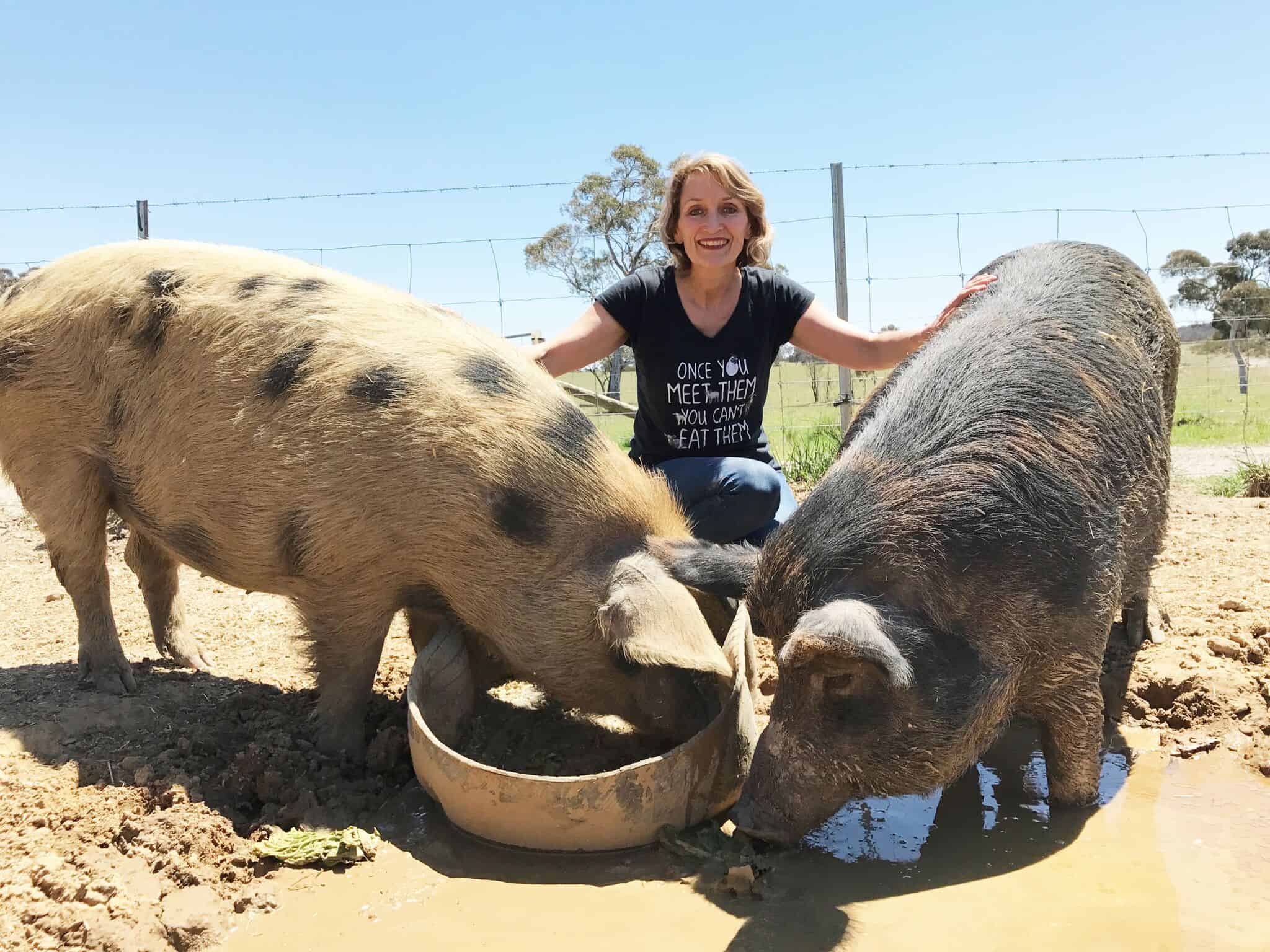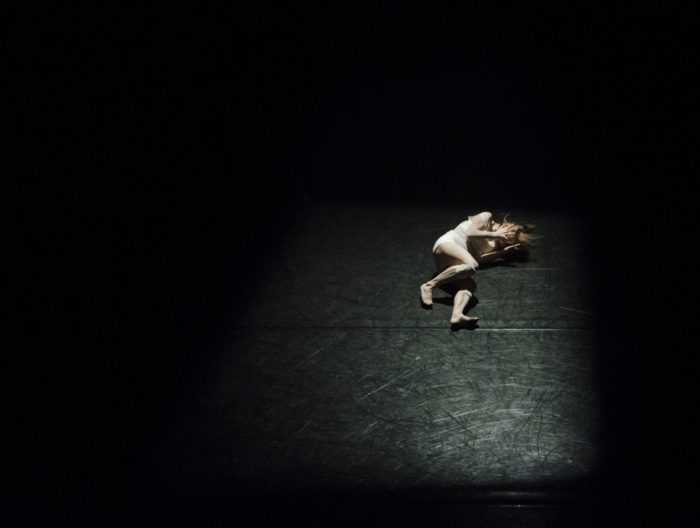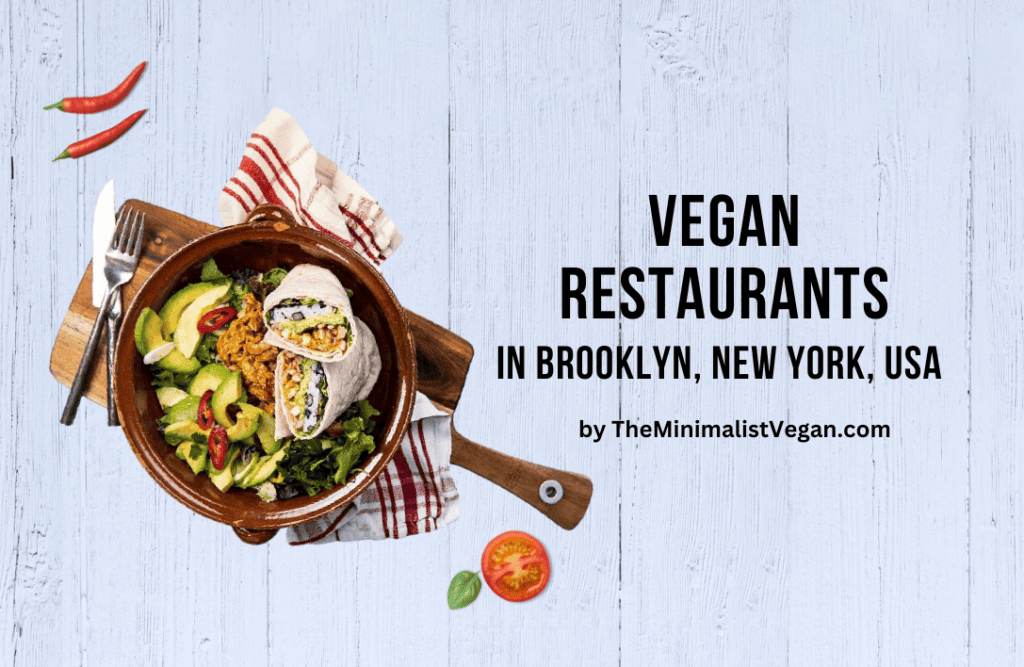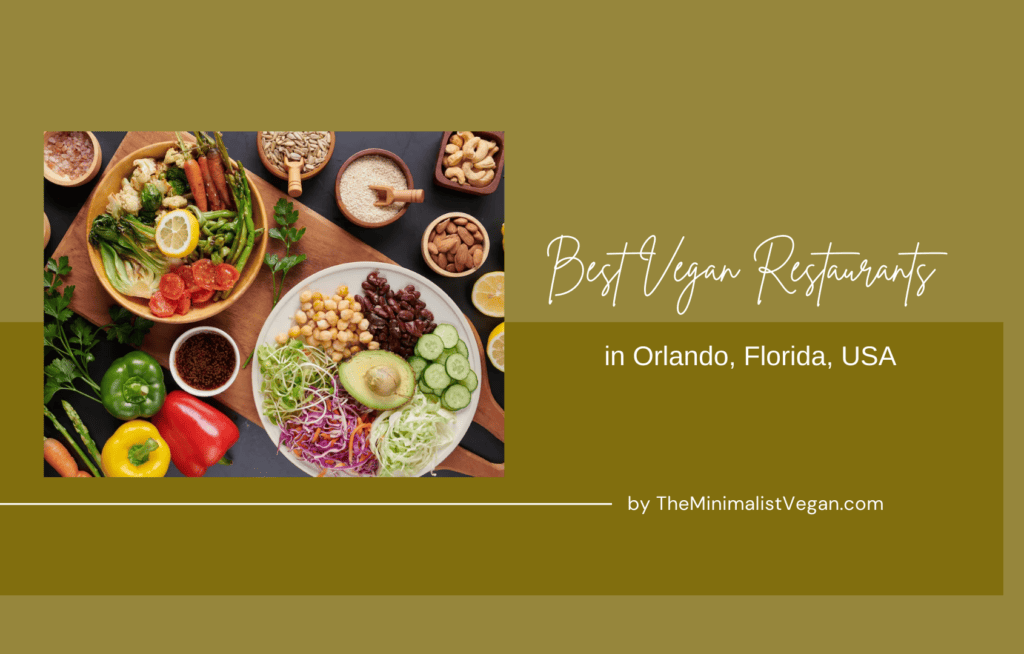Imagine a world where you felt overwhelmed and suffocated with all that was wrong. Everything you thought to be the truth, was lies. All lies.
As a result, our world becomes a dark place. A place where greed, superiority, and ego corrupt everything.
Doesn’t sound great, does it?
On the flip side, imagine a world where people regardless of their differences, the planet and animals live in peace and harmony together?
To help us better understand the gap between darkness and light, Clare Mann, author, psychologist and animal activist, has coined a new term called vystopia. We had the opportunity to sit down with Clare to discuss her book Vystopia: The anguish of being vegan in a non-vegan world.
In this conversation, we learn a little about Clare’s background before diving into what vystopia is all about. I must admit that after chatting to Clare weeks ago, Masa and I routinely throw the term vystopia around in our personal conversations, and how certain situations make us feel like we’re living in a vystopia.
Enjoy the conversation, and if you have any questions for Clare, please leave them in the comments at the end of this post.
Are you still practising psychology? Are you mainly focused on vegan clients or a broader audience as well?
I’ve been a psychologist for nearly 30 years, working in both organisational and counselling psychology. And I’ve always been the person who wants to have the conversation that matters. So whether I work with vegan or non-vegan clients, I’ve always wanted to push the envelope. Ask why they do what they do and what are the consequences of their actions. That’s how I was brought up.
I’ve been an organisational psychologist, and behind closed doors, people used to tell me their life problems in a corporate or small business environment, as many people know there’s a lot of pushing and shoving that goes on. So my goal was to focus on ethical leadership to create positive cultures.
I worked for many years behind these closed doors, and because of the experiences I had, I trained as an existential psychotherapist. You’ve got to be in therapy every week for four years during your training. So it’s very intense.
Today I spend two days a week seeing clients. And now 95% of my clients are vegan. This is largely a result of how I have become more vocal about veganism and animal rights issues.
I have also been running public leadership and communication programs which I’ve done for six years. I’ve just run my last workshop. Over the past six years, I’ve held 32 workshops, and 43 people have gone through an intensive 16-month leadership and communication program. I now want to take this experience and make it into an online program for vegans which would be at a much different and more affordable price point to what it is now.
As a vegan, I don’t think we have time to waste. So I’m very much shifting my focus to how I can help the movement.

How long have you been vegan for?
I’ve been vegan for nine and a half years. However, in 1979 I read a book by Bob Geldof called, Is That It? He talked about an abattoir he worked at in Ireland, and I gave up meat on the spot.
I just wish I had asked more questions back then or had access to vegans who could show me the way. Twenty years later, I realised that I was allergic to dairy products and so I stopped eating dairy. I only wish I had asked more questions about where dairy comes from as I would have stopped eating it much earlier.
So what happened nine and a half years ago?
My husband Brendan and I were living in New Zealand off the grid. A minimalist life. We built a house with solar and hydroelectricity, and we ran online and direct businesses via satellite internet.
It was a beautiful environment on the South Island.
One night Brendan and I heard a terrible howling. Some would close their ears, but I’m sure a lot of people reading this post wouldn’t. So we investigated to find that it was pig dog hunting.
I saw dogs thrown back in cages having been scored by pigs. Even at -7 degrees, they were left in cages. So I got video footage and had them taken away but shortly afterwards their owner in the eyes of the law (although I don’t like this term) agreed to clean up the prisoners, and they were given back to him.
We investigated more deeply and learned about the hunting culture, which is a very confronting picture. We decided to live in a rural area for many reasons, but we were witnessing this speciesism and attitude first hand, and so near to our home that we couldn’t continue to live there, so we came back to Australia.
My very wise husband said, “This can’t just be New Zealand; we need to start looking deeper.” He came across the intensive factory farming of pigs in Australia. And I honestly think at the time, being 20 years a psychologist, even working in homicide and having worked in war-torn areas in the Middle East, I didn’t think I could hurt that much after what I saw.
So then Brendan and I, with two dogs at the time, became vegan on the spot.
What is vystopia?
Vystopia is a word I created for two reasons. To validate the anguish that ethical vegans feel when they lift the veil on the truth, firstly about the systematised cruelty towards animals, which is hidden from public view of course. But then as vegans start to tell people, this trance-like collusion is what I’m calling a vystopian world.
Vystopia sounds like utopia or dystopia, and that’s where I drew inspiration for my concept.
Utopia, of course, is a place of joy, freedom, kindness and compassion. A beautiful ideal place in the world we’d like to live in.
Dystopia is darkness, greed, competition, abuse, totalitarianism. Writers such as Aldous Huxley and other existential authors write about this or, as David Icke calls it, ‘The Totalitarian Tiptoe’ and when people get there, they don’t realise that they’re there.
So when someone becomes a vegan, it’s the anguish of knowing about the systematised and industrialised cruelty towards animals on such a huge scale. And then you start to tell people who have this trance-like collusion in the dystopian world.
Now a lot of people would ask, are we really in a dystopia? And actually in a lot of cases we are. Once we lift the veil on the 150 billion-plus animals a year abused in a way that you and I know. If we didn’t know about that, what else would we not know about?
So once we start to scratch the surface as my book says, you begin to look at the environment, broader medicine, economics, education. You start to realise that what you’ve been told is not true.
But when you start to tell people, a vegan’s anguish increases, because the person refuses to talk, ignores it, or ridicules it. Or they would be in so much anguish themselves that they can’t bear for their world to be that shaken that they lose all hope. They think to themselves that nothing will ever change.
This vystopia results in an awful alienation, fear, loneliness and desperation because you can see people in the darkness being part of the collusion with this by their non-action and yet you know they’ve been duped.
But the ethical vegan can’t get away with this because they’re trying to play their part in being the solution, yet they come up against this resistance as if they’re the difficult one trying to tell people what to do.
What are you hoping to see as a transformation from people knowing about vystopia?
Giving people a label is very powerful. First, I want to validate the vegan experience. I want vegans to feel like, “Oh my god, that’s exactly what it is” in one word. It tries to simplify incredibly complex and convoluted layers of deception, subterfusion, darkness and trance-like matrix stuff.
Sometimes what I tell people is that you think you’re going to have a conversation with someone who’s taken the red pill, and they’ve taken a bottle of the blue ones.
The other part is because I’m seeing a shift in medical practice. Practitioners send people to me saying, “This person has an eating disorder, self-adjustment disorder or is self-harming because of the video footage they are watching.” When the person comes to me, they hesitantly start talking about how they’re vegan.
Imagine what my patients feel like when they find out that I’m vegan? I reassure them that they don’t have a disorder; they’ve been to the slaughterhouse, and they know what’s going on. Of course, they don’t want to eat that!
But I’m finding in the medical profession, if I don’t get the word out quickly, I think the industry is going to continue to think that the symptoms of veganism are something akin to pathological disorders, but in fact, it’s a normal response of any feeling human being. They should be feeling like this when they find out. Practitioners instead say that vegans are abusing and self-harming themselves by watching videos of slaughter footage.
In other words, practitioners say that clients have a problem when in fact they are unwittingly colluding with the vystopia.
Regarding the results that I want, it’s to empower the vegans and to help them develop a level of linguistic mastery so they can communicate effectively to get people out of the trance, so we can ultimately recreate this world.
How bad do you think this vystopia is for vegans? What have you seen with your clients on the impact of their mental health as a result of vystopia?
In one of the chapters in the book, I talk about the symptoms of vystopia, on an emotional, psychological, physical and social level.
They have symptoms that anyone linked to the medical profession would say they suffer from depression, anxiety, panic attacks, grief, suicidality, hating the human race, can’t believe that their family are a part of this. This awful angst operates at many different levels.
I once wrote an article where I started off by saying, “I’m a psychologist, and I appear to have a mental health disorder”. In this article, I said there are times where I feel depressed, anxious, and probably have panic attacks, all because of the madness of our speciesism.
But the symptoms people will have are commonly anxiety, particularly those who work undercover, for example in slaughterhouses, puppy farms, or live exports.
For the average ethical vegan, of course, you can’t walk past a restaurant and smell roast chicken without being taken back to what happened to the dear sentient animal.
If we were to hand this book to a non-vegan, what would you want them to get out of it?
I want them to break the trance. Trying to get a chink of consciousness. The first chapter of the book does not mention veganism until the very end. I want to place just a little bit of doubt in their minds for them to think, “Oh maybe I haven’t been asking the right questions? Maybe I’ve been duped? I wonder why I think like this?”
What role do you think minimalism can play in supporting people experiencing vystopia?
I was taught that frugality brings you peace in this world. My father is 94, still alive and still saves money out of his pension. I’ve always followed this principle of frugality. I drive a 20-year-old car, and I live off the grid. I’ve taken my current shoes for repair four years in a row because I don’t want them going into landfill.
There’s a constant demand for things in our system. The profit motive is there for people to keep consuming. At the same time, it’s hard. Try getting your television fixed these days; you can’t. Or the bulb to repair your projector is more expensive than a new projector. So there’s a constant disconnect between the consequences of our actions.
From a psychological point of view, people are born into what I believe is socio-economic slavery. It has been suggested that if everyone on the planet consumed as much as the average US citizen, four Earths would be needed to sustain them. This is totally unsustainable.
Living off the grid taught me something essential. I’ve become acutely aware of the environment as in New Zealand we were dependent on natural resources to power our home. So suddenly I wasn’t separate from the environment.
For many of us, when we turn on the tap or turn on a light, we don’t think about the consequences. And what my experience taught me is that we’re not in the environment, we are the environment.
Minimalism offers us a way to be connected to the consequences of our actions.






This is such a relief Clare. To have this label which describes many of the feeling .I have makes me feel less alone. Now almost 78, I became vegetarian ages 11 due to abhorrence of animal cruelty. 44 years ago .I became vegan. I have signed petitions, supported non- animal research etc . Gone on a demo if possible. I feel I have made no difference..I have been a Quaker for over 20 years and peace and the not taking of lives is pivotal. However , knowing I am vegan, has had no effect on my fellow ‘ Friends’.I have lived by example, am still a blood donor, donated a kidney in 2013, support animal- free research charities. I feel more and more upset at my inability to bring about change, to encourage nice people to look deeper at what is going on in their name.
Thank you for highlighting this. My son and his family are strict vegetarians which is such a help to me. When very young , Tony asked me what happened to the male chicks – I became vegan from that moment.
Wendy Murphy
Wow… brilliantly puts a label on exactly how i feel and how i believe I’m perceived by others (nutter)
Thank you this helps so much
Thank you for this article. I have been ethical vegan for seven years now (2014). Especially since the last years, I suffer from severe depression, sadness, despair, and suicidal thoughts because of the non-vegan world we are living in and all the suffering of sentient beings. It’s so difficult that a lot of people and ‘mainstream society’ are holding on to ‘tradiotional ideas’ about food/diet/medicine.
We’re glad you could connect with this article, Marthe. It’s incredibly sad at times to plug into the reality of our world. If you feel like you need some more support, we suggest reaching out the Clare.
You’re doing very important work! I think all vegans could become political activists and meet with candidates who are running for ejection and invite them to support vegan policies. Vegans have unused political power. Use it!
Glad you’ve brought up this problem and good to hear your own story towards veganism. Being vegan at work can be very tough, and alienating. Depends on the attitude of your colleagues, doesn’t it. In my city we have a completely vegan cafe, and one completely vegan burger place, am so joyful about those because if the psychological benefit. It’s so good to go sit in there and just feel like a valued customer, no explaining to do, no worry that a mistake will be made, and so nice to be thoroughly understood. Great to see this area of psychology growing.
Hi Patricia, we’re stoked that you have a vegan cafe and a burger joint in your area. It does make the experience way more enjoyable. Thanks for sharing your experience.
Allison,
Thanks for your comment. The reference I make to the “Totalitarian Tiptoe” is a way of explaining a concept called “Gaslighting” ie. A form of manipulation that seeks to sow seeds of doubt in a targeted individual or in members of a targeted group, hoping to make them question their own memory, perception, and sanity. I may have equally referred to a comment a dictator or prime minister might have made. It wouldn’t mean that I agree or disagree with with what they are saying but using a concept they raise as a means to explain something else. I hope this explains the use of this.
Maybe it’s my anxiety but I feel out of place in the vegan world too. I’ve had an eating disorder. Around meat eaters I hate being the odd one. Around vegans I fear not being the perfect one. I think we also have to remember that not everyone is capable of all around veganism. I think food is doable, but being able to afford other products is expensive, being able to buy organic. Etc etc is a priviledge And sometimes I feel like vegans need to keep that in mind. Steps towards the greater good are steps nonetheless. When we push too hard many people will go on the defensive. I recently joined a veg group of the city closes near me. I was immediately off put by people constantly judging one another. Be the example of that kindness. If someone’s using a product that isn’t vegan make a suggestion for what they can use instead. There are kinder ways. I’ve been vegetarian and vegan for almost 13 years now and I live in a more rural conservative community so I definitely feel it.
Hi Rosie. I think you’re spot on. It’s all about progress. We can never be perfect.
It’s a shame to hear about your experience after joining the veg group near your city. Thanks for sharing your thoughts.
Hi, I posted a comment but it has vanished. Just wanted to say that this post was so powerful and resonated with me deeply. Many thanks. Fantastic to have a word that sums it all up.
Hi Jenni, it looks like your comment came through in the end 🙂
So glad you felt some kind of relief by defining how you feel as a vegan. Clare has really hit the nail on the head with the concept of vystopia and I hope it continues to pick up momentum.
Oh my gosh, what a powerful article, I just kept nodding to myself saying yes, exactly that! I have only been vegan for a year (and vegetarian before that for thirty years, although I was ‘almost’ vegan I never made that final step until a year ago which of course I wish now that I had done years ago). It was wonderful to read this post and know that others share the exact feelings that I have, at last a word to describe it in a nutshell.